Nasa James Webb Space Telescope
- All
- News
- Videos
- Web Stories
-

James Webb Telescope Captures Neptune’s Auroras in Stunning Detail
- Monday March 31, 2025
- Written by Gadgets 360 Staff
The James Webb Space Telescope has provided the first-ever direct images of Neptune’s auroras, revealing surprising details about the ice giant’s atmosphere. Unlike auroras on Earth, Jupiter, or Saturn, Neptune’s auroras appear across unexpected locations due to its tilted and offset magnetic field. Scientists also detected the presence of H...
-
 www.gadgets360.com
www.gadgets360.com
-

NASA's Webb Captures First Direct Images Of Carbon Dioxide Outside Solar System
- Tuesday March 18, 2025
- Science | Edited by Ritu Singh
This finding provides compelling evidence that the giant planets in HR 8799 formed through core accretion, a process similar to the formation of Jupiter and Saturn.
-
 www.ndtv.com
www.ndtv.com
-

JWST Identifies Cooling Gas in Phoenix Cluster, Unlocking Star Formation Process
- Thursday February 20, 2025
- Written by Gadgets 360 Staff
The James Webb Space Telescope has detected the missing cooling gas in the Phoenix Cluster, a galaxy cluster located 5.8 billion light-years away. Researchers used the Mid-Infrared Instrument (MIRI) to identify gas at around 540,000 degrees Fahrenheit trapped in cavities within the cluster. This discovery resolves a long-standing mystery of how sta...
-
 www.gadgets360.com
www.gadgets360.com
-

James Webb Space Telescope Captures Sagittarius A Emitting Continuous Flares in Milky Way’s Core
- Thursday February 20, 2025
- Written by Gadgets 360 Staff
The James Webb Space Telescope has captured Sagittarius A*, the Milky Way’s supermassive black hole, emitting flares continuously. These bursts, varying in intensity and duration, have been observed over multiple sessions. Scientists believe the activity may be linked to magnetic interactions within the accretion disk. The phenomenon appears rand...
-
 www.gadgets360.com
www.gadgets360.com
-

Asteroid 2024 YR4 Has a 2.3 Percent Chance of Hitting Earth in 2032, Says NASA
- Tuesday February 18, 2025
- Written by Gadgets 360 Staff
Asteroid 2024 YR4, measuring 180 feet wide, has a 2.3% chance of impacting Earth on 22 December 2032, according to scientists. A smaller 0.3% risk of the asteroid colliding with the moon has also been noted. While the Earth impact could release energy equal to 8 megatons of TNT, a moon strike may create a visible crater. Researchers are using the J...
-
 www.gadgets360.com
www.gadgets360.com
-

NASA SPHEREx Mission to Map Water Ice in the Milky Way for Life’s Origins
- Monday February 17, 2025
- Written by Gadgets 360 Staff
NASA’s SPHEREx mission, launching February 27, will search for water ice and frozen compounds in the Milky Way’s molecular clouds. By surveying over 9 million regions, the mission aims to understand how these compounds influence planet and star formation. Findings will complement data from the James Webb Space Telescope, enhancing insights into...
-
 www.gadgets360.com
www.gadgets360.com
-

Webb Telescope Unveils Hidden Process Behind Star Formation in Phoenix Cluster
- Friday February 14, 2025
- Written by Gadgets 360 Staff
NASA’s James Webb Space Telescope has uncovered the missing link in star formation within the Phoenix galaxy cluster. By mapping intermediate-temperature gas, researchers identified a crucial phase of cooling that was previously undetected. This discovery explains why the cluster’s supermassive black hole does not fully prevent star formation, ...
-
 www.gadgets360.com
www.gadgets360.com
-

NASA Watches Asteroid 2024 YR4 With Chance Of Striking Earth In 2032
- Wednesday February 12, 2025
- Science | Edited by NDTV News Desk
Scientists estimate that an asteroid called 2024 YR4 has a 2.3 per cent (up from 1 per cent) chance of striking Earth in December 2032.
-
 www.ndtv.com
www.ndtv.com
-

Bill Nelson Retires as NASA Chief; Janet Petro Named Acting Administrator
- Friday January 24, 2025
- Written by Gadgets 360 Staff
Bill Nelson has retired as NASA administrator, with Janet Petro named as acting chief as Donald Trump begins his second term as president. Nelson's tenure saw the launch of landmark missions, including the James Webb Space Telescope and Artemis 1. Jared Isaacman has been nominated as the permanent NASA chief, awaiting Senate confirmation. Nelson ca...
-
 www.gadgets360.com
www.gadgets360.com
-

NASA's TESS Discovers Fastest Disintegrating Planet Ever Seen: What You Need to Know
- Monday January 20, 2025
- Written by Gadgets 360 Staff
NASA’s TESS has observed the closest and fastest disintegrating planet, BD+05 4868 Ab, located 141 light-years away. The planet loses a moon’s mass every million years as it is bombarded by its host star. Scientists are examining its massive dust trails, offering rare insights into the composition of terrestrial exoplanets. Researchers from MIT...
-
 www.gadgets360.com
www.gadgets360.com
-

Hubble’s Detailed Andromeda Galaxy Mosaic Sheds Light on Its Past and Evolution
- Tuesday January 21, 2025
- Written by Gadgets 360 Staff
NASA’s Hubble Space Telescope has produced a massive photomosaic of the Andromeda galaxy, revealing more than 200 million stars. The study offers fresh insights into Andromeda’s evolutionary history, which includes mergers with smaller galaxies. This breakthrough provides a clearer picture of the galaxy's structure and the processes that shaped...
-
 www.gadgets360.com
www.gadgets360.com
-

James Webb Space Telescope Unveils Hidden Interstellar Wonders of Supernova Cassiopeia A
- Friday January 17, 2025
- Written by Gadgets 360 Staff
The James Webb Space Telescope has provided a rare glimpse into the remnants of a centuries-old supernova in Cassiopeia A. Using infrared technology, the telescope captured a light echo caused by a massive star’s explosion, unveiling new insights into the interstellar medium and its magnetic structures. This breakthrough discovery offers valuable...
-
 www.gadgets360.com
www.gadgets360.com
-

James Webb Space Telescope Detects Supernova From 11.4 Billion Years Ago
- Friday January 17, 2025
- Written by Gadgets 360 Staff
Astronomers using the James Webb Space Telescope (JWST) have identified AT 2023adsv, a supernova that occurred 11.4 billion years ago. This stellar explosion, from a star 20 times the size of the Sun, offers a glimpse into the early universe's unique stellar evolution. Part of the JWST Advanced Deep Extragalactic Survey, the event highlights how th...
-
 www.gadgets360.com
www.gadgets360.com
-

NASA's James Webb Space Telescope Shows 3D Structure Of Dust And Gas Between Stars
- Thursday January 16, 2025
- Science | Edited by NDTV News Desk
NASA's James Webb Space Telescope has captured highly detailed images showing the complex layers of interstellar dust and gas.
-
 www.ndtv.com
www.ndtv.com
-

James Webb Telescope Reveals Intricate Layers of Interstellar Dust And Gas, NASA Shares Image
- Thursday January 16, 2025
- Science | Edited by Ritu Singh
The initial findings offer novel perspectives on the relationship between star formation and the evolution of galaxies.
-
 www.ndtv.com
www.ndtv.com
-

James Webb Telescope Captures Neptune’s Auroras in Stunning Detail
- Monday March 31, 2025
- Written by Gadgets 360 Staff
The James Webb Space Telescope has provided the first-ever direct images of Neptune’s auroras, revealing surprising details about the ice giant’s atmosphere. Unlike auroras on Earth, Jupiter, or Saturn, Neptune’s auroras appear across unexpected locations due to its tilted and offset magnetic field. Scientists also detected the presence of H...
-
 www.gadgets360.com
www.gadgets360.com
-

NASA's Webb Captures First Direct Images Of Carbon Dioxide Outside Solar System
- Tuesday March 18, 2025
- Science | Edited by Ritu Singh
This finding provides compelling evidence that the giant planets in HR 8799 formed through core accretion, a process similar to the formation of Jupiter and Saturn.
-
 www.ndtv.com
www.ndtv.com
-

JWST Identifies Cooling Gas in Phoenix Cluster, Unlocking Star Formation Process
- Thursday February 20, 2025
- Written by Gadgets 360 Staff
The James Webb Space Telescope has detected the missing cooling gas in the Phoenix Cluster, a galaxy cluster located 5.8 billion light-years away. Researchers used the Mid-Infrared Instrument (MIRI) to identify gas at around 540,000 degrees Fahrenheit trapped in cavities within the cluster. This discovery resolves a long-standing mystery of how sta...
-
 www.gadgets360.com
www.gadgets360.com
-

James Webb Space Telescope Captures Sagittarius A Emitting Continuous Flares in Milky Way’s Core
- Thursday February 20, 2025
- Written by Gadgets 360 Staff
The James Webb Space Telescope has captured Sagittarius A*, the Milky Way’s supermassive black hole, emitting flares continuously. These bursts, varying in intensity and duration, have been observed over multiple sessions. Scientists believe the activity may be linked to magnetic interactions within the accretion disk. The phenomenon appears rand...
-
 www.gadgets360.com
www.gadgets360.com
-

Asteroid 2024 YR4 Has a 2.3 Percent Chance of Hitting Earth in 2032, Says NASA
- Tuesday February 18, 2025
- Written by Gadgets 360 Staff
Asteroid 2024 YR4, measuring 180 feet wide, has a 2.3% chance of impacting Earth on 22 December 2032, according to scientists. A smaller 0.3% risk of the asteroid colliding with the moon has also been noted. While the Earth impact could release energy equal to 8 megatons of TNT, a moon strike may create a visible crater. Researchers are using the J...
-
 www.gadgets360.com
www.gadgets360.com
-

NASA SPHEREx Mission to Map Water Ice in the Milky Way for Life’s Origins
- Monday February 17, 2025
- Written by Gadgets 360 Staff
NASA’s SPHEREx mission, launching February 27, will search for water ice and frozen compounds in the Milky Way’s molecular clouds. By surveying over 9 million regions, the mission aims to understand how these compounds influence planet and star formation. Findings will complement data from the James Webb Space Telescope, enhancing insights into...
-
 www.gadgets360.com
www.gadgets360.com
-

Webb Telescope Unveils Hidden Process Behind Star Formation in Phoenix Cluster
- Friday February 14, 2025
- Written by Gadgets 360 Staff
NASA’s James Webb Space Telescope has uncovered the missing link in star formation within the Phoenix galaxy cluster. By mapping intermediate-temperature gas, researchers identified a crucial phase of cooling that was previously undetected. This discovery explains why the cluster’s supermassive black hole does not fully prevent star formation, ...
-
 www.gadgets360.com
www.gadgets360.com
-

NASA Watches Asteroid 2024 YR4 With Chance Of Striking Earth In 2032
- Wednesday February 12, 2025
- Science | Edited by NDTV News Desk
Scientists estimate that an asteroid called 2024 YR4 has a 2.3 per cent (up from 1 per cent) chance of striking Earth in December 2032.
-
 www.ndtv.com
www.ndtv.com
-

Bill Nelson Retires as NASA Chief; Janet Petro Named Acting Administrator
- Friday January 24, 2025
- Written by Gadgets 360 Staff
Bill Nelson has retired as NASA administrator, with Janet Petro named as acting chief as Donald Trump begins his second term as president. Nelson's tenure saw the launch of landmark missions, including the James Webb Space Telescope and Artemis 1. Jared Isaacman has been nominated as the permanent NASA chief, awaiting Senate confirmation. Nelson ca...
-
 www.gadgets360.com
www.gadgets360.com
-

NASA's TESS Discovers Fastest Disintegrating Planet Ever Seen: What You Need to Know
- Monday January 20, 2025
- Written by Gadgets 360 Staff
NASA’s TESS has observed the closest and fastest disintegrating planet, BD+05 4868 Ab, located 141 light-years away. The planet loses a moon’s mass every million years as it is bombarded by its host star. Scientists are examining its massive dust trails, offering rare insights into the composition of terrestrial exoplanets. Researchers from MIT...
-
 www.gadgets360.com
www.gadgets360.com
-

Hubble’s Detailed Andromeda Galaxy Mosaic Sheds Light on Its Past and Evolution
- Tuesday January 21, 2025
- Written by Gadgets 360 Staff
NASA’s Hubble Space Telescope has produced a massive photomosaic of the Andromeda galaxy, revealing more than 200 million stars. The study offers fresh insights into Andromeda’s evolutionary history, which includes mergers with smaller galaxies. This breakthrough provides a clearer picture of the galaxy's structure and the processes that shaped...
-
 www.gadgets360.com
www.gadgets360.com
-

James Webb Space Telescope Unveils Hidden Interstellar Wonders of Supernova Cassiopeia A
- Friday January 17, 2025
- Written by Gadgets 360 Staff
The James Webb Space Telescope has provided a rare glimpse into the remnants of a centuries-old supernova in Cassiopeia A. Using infrared technology, the telescope captured a light echo caused by a massive star’s explosion, unveiling new insights into the interstellar medium and its magnetic structures. This breakthrough discovery offers valuable...
-
 www.gadgets360.com
www.gadgets360.com
-

James Webb Space Telescope Detects Supernova From 11.4 Billion Years Ago
- Friday January 17, 2025
- Written by Gadgets 360 Staff
Astronomers using the James Webb Space Telescope (JWST) have identified AT 2023adsv, a supernova that occurred 11.4 billion years ago. This stellar explosion, from a star 20 times the size of the Sun, offers a glimpse into the early universe's unique stellar evolution. Part of the JWST Advanced Deep Extragalactic Survey, the event highlights how th...
-
 www.gadgets360.com
www.gadgets360.com
-

NASA's James Webb Space Telescope Shows 3D Structure Of Dust And Gas Between Stars
- Thursday January 16, 2025
- Science | Edited by NDTV News Desk
NASA's James Webb Space Telescope has captured highly detailed images showing the complex layers of interstellar dust and gas.
-
 www.ndtv.com
www.ndtv.com
-

James Webb Telescope Reveals Intricate Layers of Interstellar Dust And Gas, NASA Shares Image
- Thursday January 16, 2025
- Science | Edited by Ritu Singh
The initial findings offer novel perspectives on the relationship between star formation and the evolution of galaxies.
-
 www.ndtv.com
www.ndtv.com



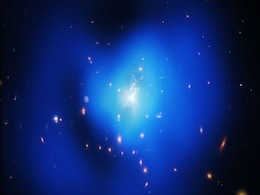
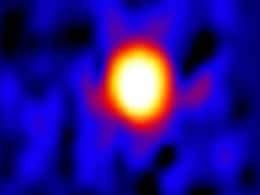
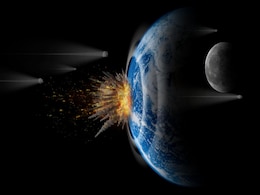

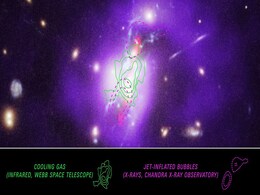
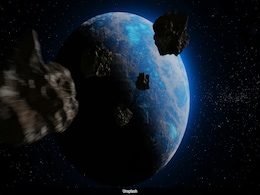

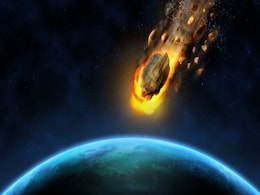
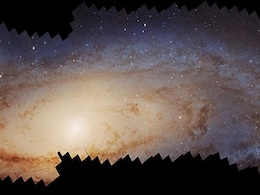
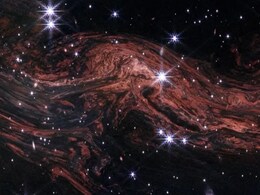
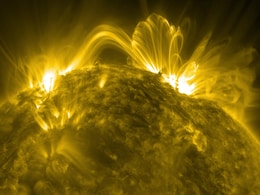


![Gadgets 360 With Technical Guruji: Did You Know? [April 6, 2024] Gadgets 360 With Technical Guruji: Did You Know? [April 6, 2024]](https://c.ndtvimg.com/2024-02/mpconh58_did-you-know_640x480_10_February_24.jpg?downsize=245:163)




